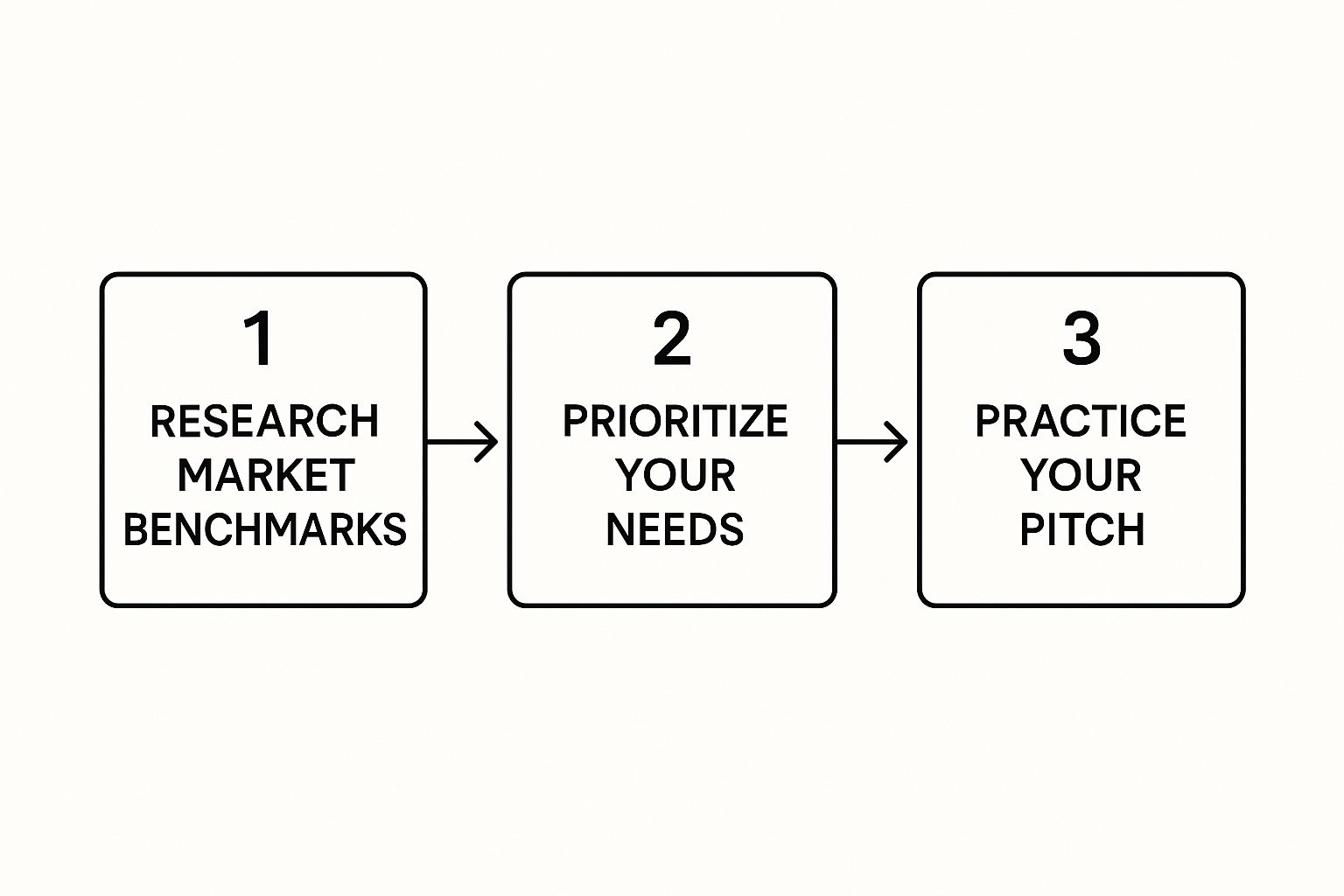How to Negotiate Severance Package: Expert Tips & Strategies
Negotiating a severance package is all about a calm, strategic approach. You’ll need to carefully review the initial offer, pull together a clear picture of your contributions to the company, and then present a logical counter-proposal. The absolute key is to stay professional. Your focus should be on making specific, justifiable requests—think beyond just the salary component and consider things like extended benefits or outplacement services. And always remember, the first offer is almost never the final offer.
Your Guide to Severance Negotiation

Losing your job is a tough experience, no doubt about it. When that severance agreement lands on your desk, it’s easy to feel like it’s a take-it-or-leave-it deal. That’s a huge misconception, and one that can cost you thousands of dollars and benefits that could be a real lifeline.
The truth is, most companies expect you to negotiate. They often build a little wiggle room into that initial offer, especially for employees who can make a compelling, professional case for more. Knowing how to negotiate a severance package properly flips the script, turning what feels like a vulnerable moment into one where you can regain a bit of control.
Understanding Your Power to Negotiate
So, where does your negotiating power actually come from? It’s not just about how many years you’ve been with the company. Your leverage is a mix of your performance, how critical your role was, and the specific reasons you’re leaving.
Let’s break down where you might have an advantage:
- Your tenure and performance: Have you been a loyal employee for years with a track record of great reviews and major contributions? That’s a huge point in your favour.
- The reason for departure: If the company is going through mass layoffs, they’re often more willing to be flexible to maintain their reputation and sidestep potential legal headaches.
- Your specialized skills: Do you have unique knowledge or skills that are a pain for them to replace? That’s a powerful bargaining chip.
- Industry standards: A little research goes a long way. Finding out what’s standard for your role and industry gives you a solid benchmark for what a fair package looks like.
The strongest position in any severance negotiation comes from being prepared. When you know your rights, understand your leverage, and present your case strategically, you can achieve a significantly better outcome.
What Is on the Table
A good severance package is more than just a lump-sum payment. There are several other pieces you can—and should—try to negotiate. If you only focus on the cash amount, you could be leaving a lot of value on the table. Think about what will help you the most in the coming months.
For example, getting your health benefits extended by just a few months could literally save you thousands in medical costs. Having the company pay for professional outplacement services could help you land your next job much faster. Every single component is a potential point for discussion.
To help you get started, I’ve put together a quick overview of the most common elements in a severance package. Think of this as your checklist to make sure you’re covering all your bases before you start talking numbers.
Key Severance Components You Can Negotiate
| Component | What to Look For | Negotiation Potential |
|---|---|---|
| Severance Pay | The standard is often 1-4 weeks of pay per year of service. | High. Often the easiest component to increase, especially for long-term employees. |
| Health Benefits (COBRA) | Continuation of health, dental, and vision insurance. Note who pays the premium. | High. Ask the company to cover the premiums for a set number of months. |
| Outplacement Services | Career coaching, résumé help, and job search support. | Medium. Companies may be willing to add or upgrade this service. |
| Unused Vacation/PTO | Payment for accrued but unused paid time off. | Varies by province. Some provinces mandate this, but you can negotiate the rate. |
| Bonuses/Commissions | Prorated payment for bonuses or commissions earned. | Medium. Depends on company policy, but a strong performance record helps. |
| Non-Disclosure/Non-Compete | Clauses that restrict what you can say or where you can work after leaving. | High. You can negotiate to narrow the scope, duration, or even remove these. |
| Letter of Reference | A neutral or positive reference for future employers. | High. This is an easy, low-cost “give” for the company. |
After reviewing these components, you can start to build a counter-offer that reflects not just what you want, but what you can realistically achieve based on your unique situation.
Taking a Closer Look at Your Initial Severance Offer
Getting that severance package can bring a rush of different feelings, and it’s natural to want to deal with it quickly. But the absolute best thing you can do right now is take a deep breath and pause. Think of that document as the opening line in a conversation, not the final say.
Before you even think about signing, treat it like any other business proposal that requires a thorough review. The first real step in figuring out how to negotiate a severance package is understanding what’s actually on the table. A lot of people mistakenly believe the first offer is a standard, take-it-or-leave-it deal. In reality, it often just covers the legal bare minimum, which can be a far cry from what’s considered fair under common law.
More Than Just the Payout
Most eyes jump straight to the total pay, but that’s only one part of a much bigger picture. A truly fair severance package should help you bridge the gap to your next role in several ways. Your task is to examine every single component to see where there’s room for improvement.
Here’s a breakdown of what you should be looking for:
- How the Pay Was Calculated: Did they offer one week of pay per year you worked, or two? Is that number based only on your base salary, or did they factor in your average bonus? The details matter.
- Continuation of Benefits: The offer needs to be crystal clear about your health, dental, and vision insurance. Will the company keep paying the premiums for a while, or are you cut off immediately?
- Unused Vacation Pay: Take a look at your provincial employment standards. Most jurisdictions require employers to pay out any vacation time you’ve earned but haven’t used. You need to double-check that this is included and the calculation is accurate.
- Bonuses and Stock Options: What about the bonus you were on track to earn this year? And what happens to any unvested stock options? Don’t just write these off—they are often negotiable.
It’s important to remember that severance isn’t always a legal requirement. In California, for instance, there’s no state or federal law mandating it, though many companies offer it as a matter of policy. A common starting point there might be one or two weeks of pay per year of service, but this can vary wildly. You can find more details about typical severance packages in California to see just how much local practices can influence an offer.
Reading Between the Lines for Red Flags
Figuring out what’s in the offer is one half of the equation. The other half is spotting what could come back to bite you. Remember, the company’s lawyers wrote this agreement to protect the company’s interests, not yours. You have to read every single clause carefully.
The company’s first offer is their attempt to limit their costs and legal risks. Your job is to make sure the final agreement is genuinely fair and supports you while you find your next role.
Keep a sharp eye out for clauses that are overly restrictive. A non-compete clause, for example, could be written so broadly that it makes finding a new job in your industry nearly impossible. You can, and should, negotiate to narrow its scope or shorten its timeframe.
Likewise, pay close attention to the “release of claims” section. This is the part where you sign away your right to sue the company for anything related to your employment. Make sure you know exactly what you’re giving up. Vague, catch-all language here is a massive red flag and a sign you should probably run the document by a lawyer.
Building a Persuasive Case for More

Alright, you’ve reviewed the initial offer. Now comes the critical part: building a logical and compelling argument for why you deserve more. This isn’t about emotion or making demands out of thin air. It’s about constructing a fact-based case that shows why a better package isn’t just what you want, but what’s fair.
Your entire goal here is to shift the conversation. You want to move it from what the company has decided to offer to what’s reasonable given your specific history and circumstances. To do that, you need to get your ducks in a row and gather some solid evidence. Think of this as your opportunity to remind them of the value you delivered and the real-world situation you’re now facing.
Document Your Value and Contributions
First things first, you need to create a clear record of your accomplishments and the impact you had. You can’t assume HR or your manager remembers every win or late night you put in. It’s your job to put it all down on paper.
Start pulling together tangible proof of your performance. Grounding your negotiation in facts, not feelings, makes it incredibly difficult for the company to simply say no.
- Performance Reviews: Dig up all your past reviews, especially the ones that sing your praises. Look for phrases like “exceeds expectations” or specific callouts from managers about great work.
- Big Wins & Projects: Make a list of the major projects you led or played a key role in. The secret here is to quantify everything. Don’t just say you improved efficiency; say you “Led the team that increased departmental efficiency by 15%.” Don’t just say a project went well; mention it “came in $50,000 under budget.” Numbers talk.
- Happy Clients: Did you ever get emails from clients complimenting your work? Find them. This is gold—it’s third-party validation of your skills.
- Unique Skills: Jot down any special skills, certifications, or deep institutional knowledge you have. Frame it in terms of how hard and expensive it will be for them to replace that expertise.
This file of evidence is your leverage. It clearly shows you were a high-value asset, and your departure creates a real gap they need to fill.
Research Industry and Company Benchmarks
Your personal contributions are one half of the equation. The other half is what’s considered standard practice out in the real world. If you don’t have this context, you’re basically negotiating blind. You have to understand what people in similar roles, with similar experience, are actually receiving.
Get online and start digging. Look for data on typical severance packages for your position, your industry, and your tenure. Professional networks like LinkedIn can be a good source, and don’t be afraid to discreetly talk to former colleagues who’ve been through this. The point is to show that what you’re asking for isn’t just a random number, but something that aligns with professional norms.
A common starting point for severance is one to two weeks of pay for every year you worked there. But that’s just it—a starting point. For senior positions or employees with a long history at the company, pushing for three or even four weeks per year is far from unheard of.
Articulate Your Future Challenges
Finally, your case needs to touch on the real-world challenges you’re about to face finding a new job. This isn’t about complaining; it’s about professionally framing your need for a more substantial runway to your next opportunity.
Bring up a few practical factors:
- The Job Market: Is your industry booming right now, or is it in a downturn? Be honest about it.
- Your Role’s Niche: Highly specialized or senior roles naturally take much longer to find and fill.
- Timing is Everything: Are you being let go right before the holidays or during the summer slowdown? Hiring freezes are real, and that can significantly extend your job search.
By weaving together your documented value, solid market research, and a realistic look at your job search timeline, you create a powerful, multi-pronged argument. This changes the dynamic entirely. Your counter-offer is no longer just an “ask”—it’s a well-reasoned proposal for a fair and professional exit.
How to Present Your Counter-Offer
You’ve done the homework and gathered your evidence. Now comes the critical part: actually making your counter-offer. How you approach this conversation can make all the difference. The aim here is to be confident and firm, yet collaborative. Think of it less as making demands and more as opening a discussion to find a solution that works for everyone.
Picking Your Moment (And Method)
First things first, how should you initiate this? While picking up the phone might feel more direct, I almost always recommend starting with a carefully written email. An email gives you the space to lay out your arguments logically and, just as importantly, creates a paper trail. It also gives the HR manager or your former boss a chance to digest what you’re proposing before they react, which usually leads to a much more productive conversation.
Kicking Off the Conversation
Your opening line really sets the tone. You want to avoid coming across as aggressive or demanding. Instead, your goal is to frame this as a partnership to reach a fair conclusion.
Keep it simple and professional. Something like, “Thank you for sending over the severance agreement. After reviewing it, I have a few thoughts I’d like to discuss to ensure we can part ways on positive and mutually respectful terms.” This simple sentence immediately frames the conversation as a collaborative one.
From that point, you can smoothly transition into your specific asks. Just remember to tie every single request back to the research and documentation you’ve prepared. There should always be a clear “why” behind everything you’re asking for.
One of the biggest mistakes people make is just accepting the first offer. Companies almost always expect some negotiation and often build wiggle room into the initial package. If you can build a strong case based on your contributions and what’s standard in the industry, you’re in a great position.
Thinking Beyond the Cash
While more severance pay is usually the main goal, don’t get tunnel vision. Non-monetary benefits can be incredibly valuable and are often much easier for a company to say “yes” to. Think about what would genuinely help you bridge the gap to your next job.

This image really drives home the point: a successful negotiation starts long before you send that first email. It’s built on a solid foundation of research and knowing what your priorities are.
Here’s a look at some of the most valuable non-cash items you can—and should—ask for.
Comparing Monetary vs Non-Monetary Asks
Explore valuable non-cash items you can request to enhance your severance package.
| Negotiable Item | Description | Why It’s Valuable |
|---|---|---|
| Extended Health Benefits | Requesting that the company continues to pay your health, dental, and vision insurance premiums. | This can save you thousands of dollars in out-of-pocket COBRA payments and provides a crucial safety net. |
| Outplacement Services | Professional services that include career coaching, résumé writing, and interview preparation. | It’s a win-win. You get expert help to land a new role faster, and the company sees it as a positive gesture. |
| Letter of Recommendation | A pre-written, positive reference letter signed by your former manager. | This is a low-cost, high-value item for the company to provide, and it can be a huge help in your job search. |
| Non-Compete Flexibility | Negotiating to reduce the scope or duration of a non-compete clause, or remove it entirely. | This gives you more freedom and flexibility to find your next role without being restricted. |
| Company Property | Asking to keep your company-provided laptop, phone, or other equipment. | If the gear is a few years old, the company may see it as easier than wiping and reissuing it. |
A great way to phrase these requests is to focus on the mutual benefit. For instance, you might say, “Given the competitiveness of the current job market, having access to professional outplacement services would be a huge help in speeding up my search. Is that something the company would be willing to support?” It sounds reasonable and professional.
By presenting a smart mix of monetary and non-monetary requests, you demonstrate that you’ve thought through the situation carefully. It positions you not as a problem, but as a pragmatic professional looking for a fair resolution, which makes the company far more likely to meet you in the middle.
Navigating the Legal and Financial Minefield

Getting a fair severance package isn’t just about the final dollar amount. That document they slide across the table is a serious legal and financial instrument, and you can’t afford to just skim it and sign. This is one of those times when a DIY approach could backfire, costing you dearly down the road.
Before your pen even touches that paper, I can’t stress this enough: get an employment lawyer to review the agreement. They have a trained eye for the kind of subtle, tricky clauses that most of us would miss. A good lawyer can immediately spot things like an overly restrictive non-compete clause or vague “release of claims” language that’s really just there to protect the company.
A severance agreement is a legally binding contract. Remember, it was written by the company’s lawyers to protect the company’s interests. Having your own expert in your corner is the only way to make sure your rights and future career are just as protected.
What a Lawyer Really Brings to the Table
An employment lawyer does more than just read the fine print. They bring invaluable context. They know what’s considered standard and reasonable under common law, which often entitles you to a much more generous package than the bare-minimum statutory amounts your employer might offer first.
Think of it this way: their professional opinion adds a ton of credibility to your counter-offer. They can also tell you if certain clauses are even enforceable in your province and give you the right words to push back professionally. That kind of legal insight is a massive advantage to have in your negotiation toolkit.
Severance Pay and Unemployment Benefits
This is where things can get really confusing. One of the biggest questions I get is about how severance pay impacts your eligibility for Employment Insurance (EI). The two are definitely related, but the rules can be tricky and depend on how your payout is structured. Getting this wrong can leave you with a serious financial gap right when you need the stability.
The structure of your payout is key. For example, the way Service Canada treats severance pay can directly affect when you can start receiving EI benefits. It’s often considered earnings, which can delay your benefits.
- Lump-Sum Payout: If you receive your severance all at once, those earnings will be allocated to the weeks immediately following your last day of work. This will delay the start of your EI claim.
- Salary Continuation: If your employer continues to pay you on your regular pay schedule, you’re essentially still receiving earnings. You likely won’t be able to claim EI until those payments run out.
Getting a handle on these details is absolutely critical. It allows you to be strategic when negotiating the structure of your payout. A quick consultation with a legal professional can clear up these nuances in a heartbeat, helping you make the smartest financial decision for your specific situation.
Frequently Asked Questions About Severance Negotiations
When you’re handed a severance package, your head is probably spinning with questions. That’s completely normal. Getting solid answers is the first step toward walking into a negotiation feeling prepared and in control.
Let’s dig into some of the most common questions that come up. Getting clarity on these points will help you sidestep common mistakes and build a much stronger strategy.
How Much Time Do I Have to Decide?
Most offers include a deadline, and it can create a real sense of pressure. Typically, a company will give you somewhere between five and 21 days to review the agreement and make a decision. But that clock isn’t always as rigid as it seems.
Don’t be afraid to ask for more time. It’s a completely reasonable request, especially if you need a lawyer to look over the details. A simple, professional email explaining that you need a few extra days to properly review the terms is a standard part of this process. Rushing this decision is the last thing you want to do.
Will I Burn Bridges If I Negotiate?
This is a big one. So many people worry that trying to negotiate will make them look greedy or ungrateful, but that’s rarely the case when it’s done right. Think about it: negotiation is a standard business practice. Your employer expects it.
The secret is all in your approach. Keep it professional. You’re not making demands; you’re having a conversation to find a fair middle ground that honours your contributions. A calm, respectful, and business-like tone reinforces your professionalism—it doesn’t burn bridges.
When you negotiate professionally, you’re not being difficult. You’re demonstrating the same thoughtful, strategic approach you brought to your job. Any reasonable employer will respect that.
Can I Still Negotiate If I Was Fired “For Cause”?
It’s definitely a tougher hill to climb, but it’s not automatically a lost cause. Everything hinges on how solid the company’s reason for termination actually is. If their case for “cause” is shaky, poorly documented, or borders on discrimination, you might have more leverage than you realize.
In situations like these, an employer may offer a small package just to close the book and avoid the headache and cost of a potential wrongful dismissal lawsuit. This is precisely where you need an employment lawyer. They can assess the strength of the company’s position and tell you what’s realistic.
What Happens If They Say No to My Counter-Offer?
If your employer rejects your counter-proposal and won’t budge, you have a decision to make. You can accept their original offer, or you can refuse to sign and consider your next steps if you feel the offer doesn’t meet your legal entitlements.
This is a crucial moment. You have to weigh the sure thing on the table against the uncertainty and potential expense of pushing further. Getting a legal opinion at this stage is absolutely critical to making a smart, informed choice that protects your financial future.
At UL Lawyers Professional Corporation, we specialize in helping employees across Ontario understand their rights and secure fair severance agreements. If you’ve been given an offer, don’t go it alone. Contact us for a free, no-obligation consultation to make sure you’re getting everything you deserve.
Related Resources
What Is Wrongful Dismissal in Ontario: A Guide to Your Termination Rights
Continue reading What Is Wrongful Dismissal in Ontario: A Guide to Your Termination Rights7 Best Employment Lawyers in Ontario: A Complete 2026 Guide
Continue reading 7 Best Employment Lawyers in Ontario: A Complete 2026 GuideNEED A LAWYER?
We are here 24/7 to address your case. You can speak with a lawyer to request a consultation.
905-744-8888GET STARTED WITH A FREE CONSULTATION
Why Choose UL Lawyers
- Decades of combined experience
- Millions recovered for our clients
- No fee unless we win your case
- 24/7 client support
- Personalized legal strategies